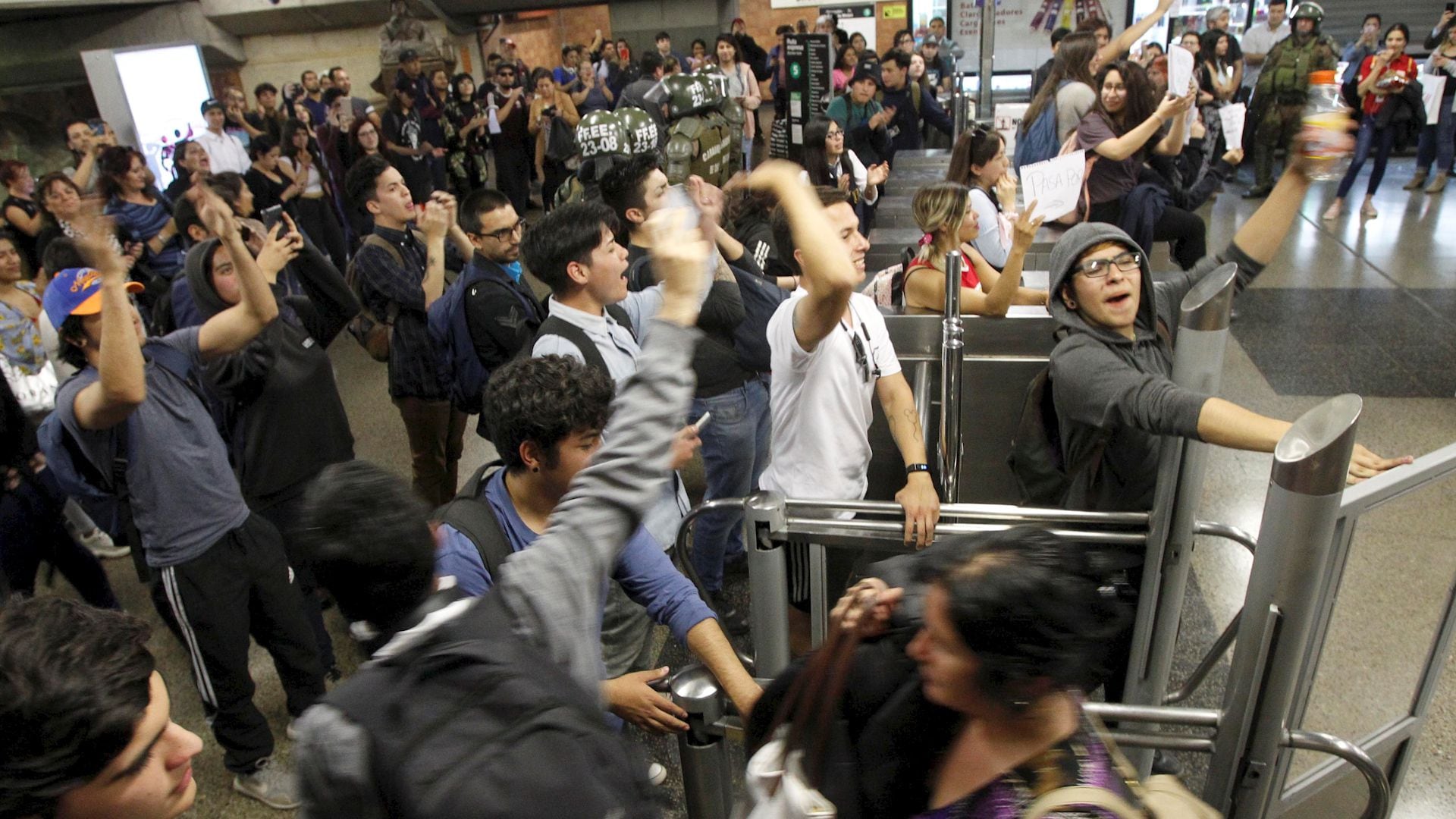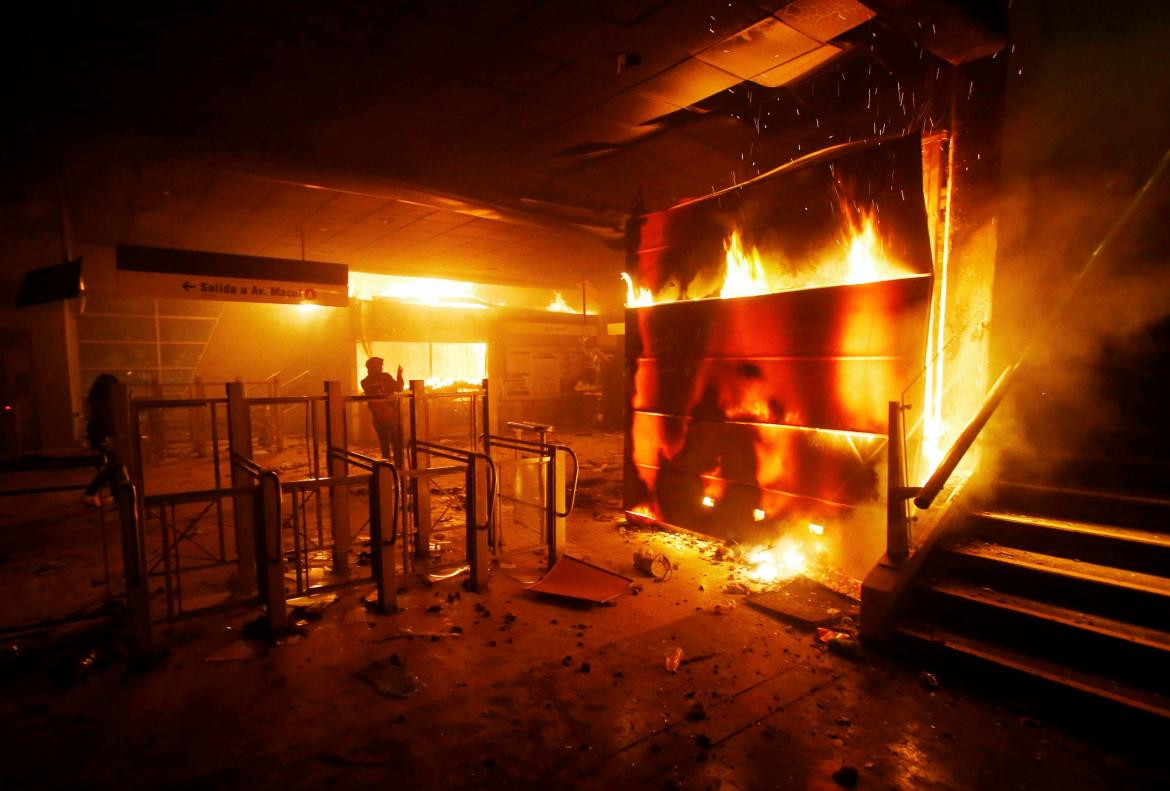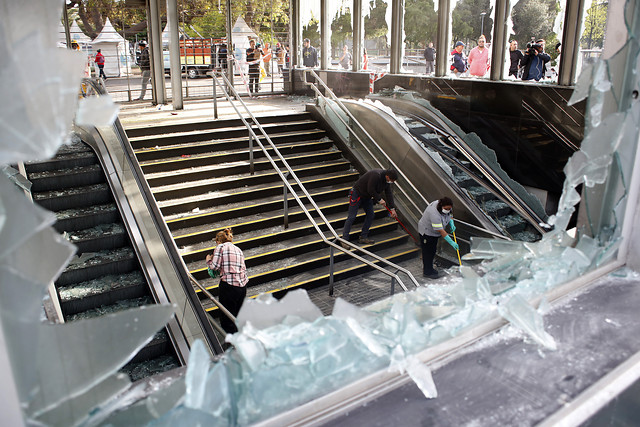La tercera semana de Octubre, parte de los chilenos se lanzo a las calles para reclamar por varias demandas económicas, llegando a reunir más de un millón de personas en la ciudad de Santiago, a lo cual el gobierno de Sebastian Piñera respondió con unas pocas medidas que la ciudadanía consideró insuficientes.
Después de una semana de manifestaciones, la presión ha disminuido pero no lo suficiente como para asegurar la total normalidad. Hay sectores que intentarán seguir en la calle, como el PC, el Frente Amplio y la CUT, que convocaron a más días de paro y protesta. A estas fuerzas parece haberse sumado el Partido Socialista, que escogió una de las dos veredas en las que se sitúa ahora mismo la oposición.
En una de ellas están los tres partidos políticos que concurrieron a La Moneda para dialogar con el Presidente (DC, PPD, PR) y en la otra está el resto, básicamente comunistas, socialistas y frente amplistas. Estos últimos viven su propia crisis. Su mentor e ideólogo, Carlos Ruiz, les manda un severo «tirón de orejas». Les dice que deben dejar de actuar erráticamente y que «este no es momento de sacarse selfies en las marchas» sino que hay que irse para la casa a escribir propuestas y tratar de impulsarlas (La Tercera).
Pero, ¿quién esta detrás del caos generado en estos días? ¿Es casual el incendio simultáneo de varias estaciones de metro y el edificio ENEL? ¿Habrá grupos anárquicos o el narcotráfico detrás de estos atentados ?
Este es un remezón por habernos creído un país rico por mucho tiempo, dejando de lado a los que quedaban en el camino.
Si no nos ponemos de acuerdo corremos el riesgo de caer en populismos o extremismos. No debemos sacrificar todos los logros conseguidos por la premura de mejorar las cosas.
La salida real a esta crisis es la de un gobierno de unidad nacional. Para que eso ocurra, no sólo deben los opositores aceptar ser parte de este proyecto, sino que los que hoy están en el poder deben aceptar reducir el suyo. Se debe convocar a una agenda clara, garantizar el crecimiento económico para solventar mayores demandas. Regular las concentraciones de poder por sectores industriales fin incentivar la competencia. Fortalecer los municipios y las regiones. Modernizar la educación. Modernizar el Estado y rebajar la burocracia.
Sería un error politico pensar en cambiar el modelo económico, en vez de mejorarlo.
Debemos entender que un aumento del 4% al fondo de pensiones es insuficiente para obtener una buena tasa de reemplazo en el tema de las pensiones a largo plazo.
La rebaja de dieta de los parlamentarios debiera ser cercana o superior al 50% de su remuneración actual.
Como hemos podido apreciar, gran parte de la ciudadania está de acuerdo con las manifestaciones que piden cambios sociales mediante medios pacíficos lo que cambia radicalmente si se producen actos violentos o delictivos.
Por otro lado se percibe que el gobierno no ha reaccionado oportunamente en ofrecer soluciones a esta crisis.
Siendo las principales motivaciones que han generado estas manifestaciones los sueldos de los trabajadores, los precios de los servicios básicos (luz, agua, gas), las pensiones de los jubilados y la desigualdad económica entre los chilenos.
Dentro de las medidas propuestas por el Presidente Piñera, las mejor evaluadas son: La reducción de las dietas de los parlamentarios y altos sueldos de la administración pública y reducción en el número de los parlamentarios, el proyecto que crea el derecho a la Sala Cuna Universal a todos los niños de madres o padres que trabajen y el proyecto que establece la reducción de las contribuciones de los adultos mayores más vulnerables. Y a su vez los peor evaluados son: El Seguro que cubre parte del gasto en medicamentos, el aumento de Pensiones de Vejez y el Ingreso Mínimo Garantizado de CL$ 350.000.-
Las medidas que debiera tomar el gobierno para superar la crisis debiera ser: Escuchar las demandas ciudadanas y generar un plan de mejoras, reconocer los problemas de desigualdades en Chile y llamar a un acuerdo político con todos los partidos de Chile y entender en detalle los malestares de la ciudadanía.
Y como medidas concretas que debiera tomar el gobierno para superar la crisis económica seria: Mejorar el sueldo mínimo, congelar el alza de los servicios básicos (luz, agua, gas), mejorar las pensiones en su pilar solidario, disminuir la Dieta Parlamentaria, reducir el número de Parlamentarios y la gratuidad en Transporte Público para los adultos mayores.
Es fundamental no perder el norte de las demandas de la ciudadanía que no contemplan dentro de sus prioridades la modificación a la actual Constitución o la creación de una Asamblea Constituyente que en algunos países ha obtenido un poder absoluto, por encima incluso de los tres poderes del Estado.
Fuente estadística: Activa Research













